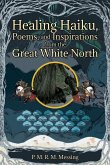This is the forty-fifth bilingual haiku collection originally written by this author and introduces haikus featuring Japanese internment in Siberia after World War II. Shortly after the American B-29 bomber Enola Gay dropped an atomic bomb on Hiroshima, the Soviet Army invaded Manchukuo, a puppet state of Japan in northeast China, at midnight on August 9, 1945, unilaterally revoking the Neutrality Treaty between Japan and the Soviet Union. At that time, more than two million Japanese lived in Manchukuo, out of which 270,000 Japanese farmer settlers guarded the frontier region near the border with the Soviet Union. The Soviet Army plundered, massacred, and raped the Japanese settlers and then occupied its capital Xinjing (current Changchun) and other major cities. Then, against the Geneva Conventions regarding the treatment of POWs, which stipulated immediate repatriation of the POWs, the Soviet Army transferred 575,000-660,000 Japanese POWs to gulags (forced labor camps) in Siberia and Soviet Republics such as Kazakhstan and Uzbekistan, by deceiving them saying, "Domoy" (homeward). Some of them were repatriated by 1947, but many remained detained in gulags. It was not until December 1956 when Prime Minister Hatoyama Ichirō (1883-1959) resumed diplomatic relations between Japan and the Soviet Union by signing the Japan-Soviet Joint Declaration with Premier Nikolai Bulganin in Moscow, with outright intervention from the Eisenhower administration, that the remaining Japanese POWs were finally repatriated. The lives of the repatriates were not easy, either. After 11 years of internment, many of them had no homes to back to nor jobs to work. They were even accused of being communists, as Stalin had launched the "democratization" movement in the gulags, so that the interned Japanese would propagate communism upon repatriation. In addition, due to the physical and psychological trauma of internment, many of the repatriates did not speak out, so that no compensation was provided for them. The repatriates from Siberia are dying out, but their sufferings and traumas deeply resonate in the hearts of the survivors and their kin today. These experiences should not be buried in the vault of history. Reconciliation and healing from these wounds begin with acknowledgement of the truth. Upon recognition of the true facts, one can learn lessons so as not to repeat the same tragedies and move forward. The essence of haiku is to elevate one's feelings to a more objective and larger perspective. This mental engagement can facilitate embracing empathy for victims of tragedies and can serve as a healing process for the victims. With this in mind, this haiku collection examines the Japanese internment in Siberia against the backdrops of World War II and the postwar Japan-Soviet relations and expresses them in a form of concise poetry with annotations. Specifically, this haiku anthology presents 83 haikus written by the author with appropriate season words per the Japanese calendar.
Bitte wählen Sie Ihr Anliegen aus.
Rechnungen
Retourenschein anfordern
Bestellstatus
Storno








